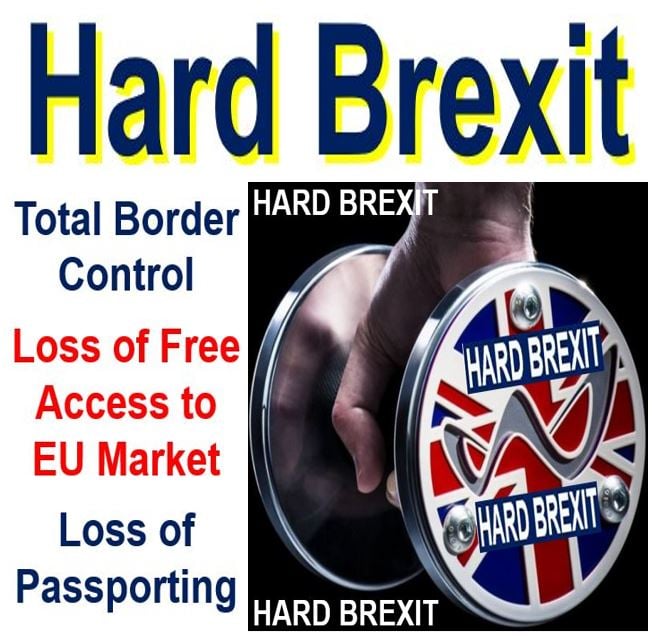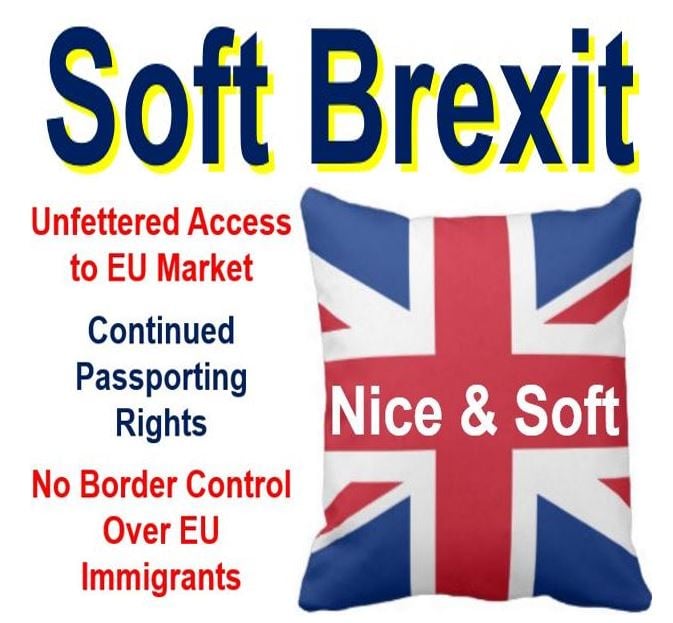A Hard Brexit is one of the ways the United Kingdom could separate itself from the European Union. The other way is with a Soft Brexit. Both terms refer to the closeness or distance of Britain’s relationship with the EU after the divorce has been completed. BREXIT stands for BRitain EXITing the European Union.
On 23rd June 2016, there was an in-out referendum in the UK regarding its membership of the European Union.
The majority of the British electorate – 52% – voted to Leave, while 48% chose to Remain. Turnout was 71.8%, with over 30 million people voting.
British and foreign businesses want a soft Brexit. They say it is crucial that the UK does not lose free access to the EU market.
Theresa May
Prime Minister Theresa May says she will respect the will of the electorate. She was against leaving the EU during the referendum campaign.
May insists that ‘Brexit means Brexit.’ However, there will be a great deal of debate regarding exactly what Brexit means, especially on two issues:
1. How UK companies do business with the EU.
2. How much control Britain regains regarding the movement of EU citizens into the country.
Currently, EU nationals can come and live-work in the UK as if they were in their own country.
Border control
One of the main concerns leading up to the referendum was border control. In other words, regaining the country’s ability to decide who comes into the country, how, who can work, etc.
Had border control not been high up in people’s mind, the electorate would have voted to remain.

What exactly is a Hard Brexit?
Both terms have not been precisely defined. A Hard Brexit would probably involve Britain refusing to compromise on key EU issues, such as the free movement of people, leaving the single market completely, and trading with the EU as if it were any other nation or trading bloc outside Europe, based solely on WTO (World Trade Organization) rules.
At least in the short-term, until a deal was signed, a Hard Brexit would most likely mean that tariffs of 10% to 20% would be added to exported and imported items. There would probably be other trade restrictions.
Passporting
It would also mean Britain losing its passporting rights, also known simply as passporting. Passporting refers to exercising the right for a financial institution registered in the European Economic Area (EEA) to do business in any other EEA nation without needing to request further authorization from that country.
Put simply, passporting is a bit like being given a financial passport to operate across the whole European Union plus Norway, Iceland and Liechtenstein.

Soft & Hard Brexit – timeline
Some people say that the timeline will also determine whether the country has a Soft or Hard Brexit.
The separation negotiations will take several years – most experts estimate two years at least. Some say the whole thing could take from five to ten years.
A Soft Brexit might also refer to a transitional arrangement of some form after Article 50 is invoked. Article 50 is part of the Lisbon Treaty that includes a very basic 5-point plan should any member state wish to leave the EU. Article 50 is what a member state invokes signaling the beginning of exit negotiations. The leaving member must complete it within two years.
According to the European Commission:
“During negotiations under Article 50, European Union Treaties and law continue to apply to the UK. If no agreement is reached within two years of the UK activating Article 50, the UK would leave the EU without any new agreement being in place.”
What exactly is a Soft Brexit?
A Soft Brexit is a gentle, semi-detached separation, in which the UK gains a certain amount of independence but keeps some of the vital features of its relationship with the European Union.
EU Market
There would be free access to the EU market, which represents over 50% of all British exports. Maintaining free access to that market is crucial for the country’s economic health and protecting employment, the vast majority of UK businesses say.
Passporting
British and foreign financial institutions that operate mainly in the City of London would still be able to operate across the whole of the European Union plus three other countries.
Business leaders say that maintaining passport rights is the only way to make sure London continues being Europe’s most important financial centre.
Movement of People
The UK would have to sign up to the free movement of people. European Union citizens would still be able to come to the UK, stay, and work in the country without having to get special work-permits or resident visas.
Recent fears over the value of the pound after #Brexit are “over the top” says ex @bankofengland boss Mervyn King https://t.co/bkSuyenMjU
— Sky News (@SkyNews) 10 October 2016
The business community
The British business community would prefer either remaining in the EU. They would also accept having a very Soft Brexit. However, the majority of the country’s electorate want a Hard Brexit.
Some politicians and economists say that most members of the general public would soon change their minds. Specifically, they’d change their minds as soon as they realized what Brexit really meant.
The pro-Leave camp accuses the Remainers of using scare tactics. Since the referendum, virtually all economic indicators (until today, 10th October 2016) have been positive. This does not mean the economists were wrong – perhaps it is still early days.
Pound sterling
The pound sterling devalued immediately after the referendum and has not recovered. It is today worth about 15% less versus the US dollar than it was before 23rd June.
However, a cheaper pound means more competitively-priced exports. Over the past three months, British exports have increased.

The Prime Minister’s dilemma
The Prime Minister has found herself in a Catch 22 situation. A Soft Brexit would theoretically protect the economy, please businesses and secure future investments in the country as well as employment.
However, a Soft Brexit would mean no control regarding immigration from other parts of the EU – something the electorate made clear was a top priority.
The electorate would be furious – they would accuse the Government of leading the country into a step backward; having no control regarding immigration while losing all influence over EU law-making.
A Hard Brexit would please the majority of voters, but would probably come at great economic cost. Mrs. May would eventually get the blame for the likely severe recession and rise in unemployment following a Hard Brexit.
What kind of Brexit?
The Government now has to decide what kind of Brexit to aim for, while at the same time bearing in mind:
1. The will of the people.
2. The economy of the country.
3. What deal the heads of states of EU member countries would agree to.
Video – Is UK heading for a Hard Brexit?
This video from the Embassy of Italy in London has comments by Ambassador Pasquale Terracciano. He expresses his thoughts regarding a Soft or Hard Brexit.
